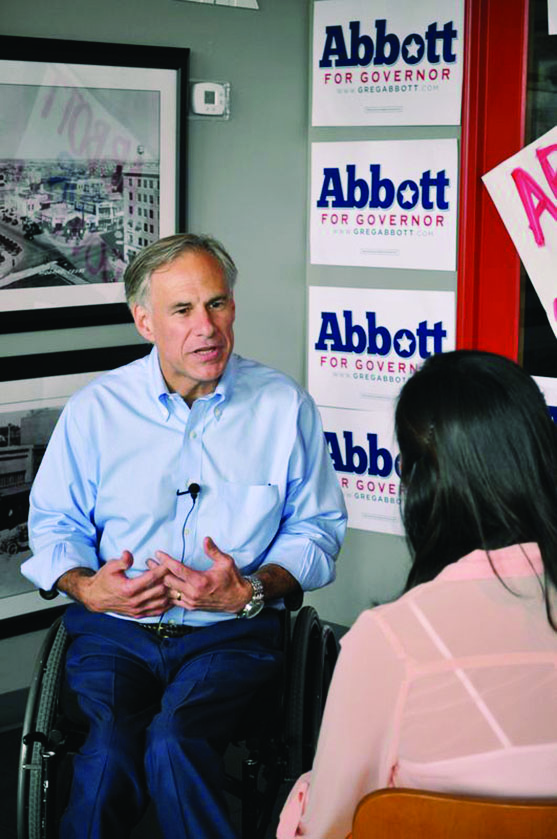 The week after launching his campaign to become Texas’ 48th governor, Greg Abbott ’84 took a whirlwind 10-city tour. An immediate front-runner who won the race in November against Democrat Wendy Davis by a wide margin, the Republican Texas attorney general touted his record as one of the most aggressive and conservative attorneys general in the nation. But Abbott surprised many by discussing an aspect of his life he had downplayed for the past 30 years—the accident that left him paralyzed and wheelchair-bound at 26. “I actually have a steel spine,” he told voters when he announced his candidacy in July 2013, “and I will put that to work for you.”
The week after launching his campaign to become Texas’ 48th governor, Greg Abbott ’84 took a whirlwind 10-city tour. An immediate front-runner who won the race in November against Democrat Wendy Davis by a wide margin, the Republican Texas attorney general touted his record as one of the most aggressive and conservative attorneys general in the nation. But Abbott surprised many by discussing an aspect of his life he had downplayed for the past 30 years—the accident that left him paralyzed and wheelchair-bound at 26. “I actually have a steel spine,” he told voters when he announced his candidacy in July 2013, “and I will put that to work for you.”
A native of Wichita Falls, Texas, Abbott moved with his wife, Cecilia, to Houston, where he had joined Butler & Binion as an associate immediately after his graduation from Vanderbilt Law School in 1984. Just two months later, Abbott was jogging during a break from studying for the bar exam when a storm-damaged oak tree suddenly crashed down, crushing him and severing his spine. Throughout his recovery, it was clear that Abbott would continue his pursuit of a fast-track, high-profile career. The Houston rehabilitation hospital where he was treated installed a second phone line in his room so he could work throughout his recovery. “It changed my life forever,” he said in an MSNBC interview, “but I learned at that crucial time in my life, you never look back. Just because this happened doesn’t mean I can’t do whatever it is I wanted to do.”
After starting his career in private practice, Abbott went on to serve as a state trial judge starting in 1993, was appointed by then-Governor George W. Bush to the Texas Supreme Court in 1996, and then was elected state attorney general in 2002. A February 2013 article in Governing named Abbott as one of the top Texas Republican officials to watch in 2013.
Abbott’s record as attorney general includes high-profile cases and important enforcement actions. Early in his 12-year tenure, he established a cyber-abuse unit to focus on online predators and a Medicaid fraud unit. He made collecting delinquent child support a priority. His prosecution of members of the Fundamentalist Church of Jesus Christ of Latter-Day Saints for the sexual abuse and forced marriage of underage girls on their Texas-based compound made national news. In 2005, he filed suit against Sony BMG Music Entertainment, marking Texas as the first state in the nation to bring legal action against a company for installing illegal “spyware” on devices. He famously defended the state’s Ten Commandments monument, which had stood on Texas’ capitol grounds for 40 years, winning a 5-4 victory before the U.S. Supreme Court. He ultimately brought 30 lawsuits against the federal government on behalf of the state of Texas.
In a campaign ad, Abbott describes a crucial element of his recovery from his spinal injury. “After my accident, I had to rebuild my strength,” he told viewers. “I would roll up an eight-story parking garage, spending hours going up the ramps. With each floor, it got harder and harder. But I wouldn’t quit. Just one more, I would tell myself, just one more. I see life that way, and it’s how I will govern Texas. To get to the top, we must push ourselves to do just one more.”